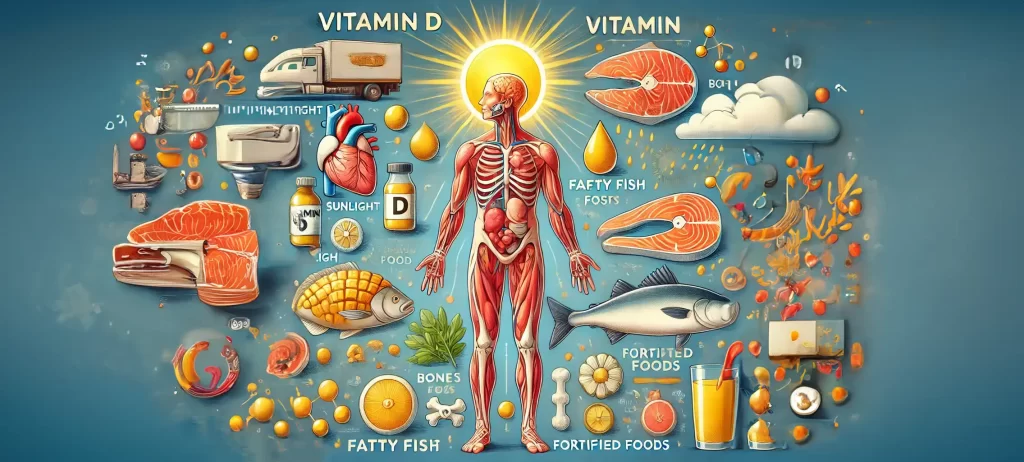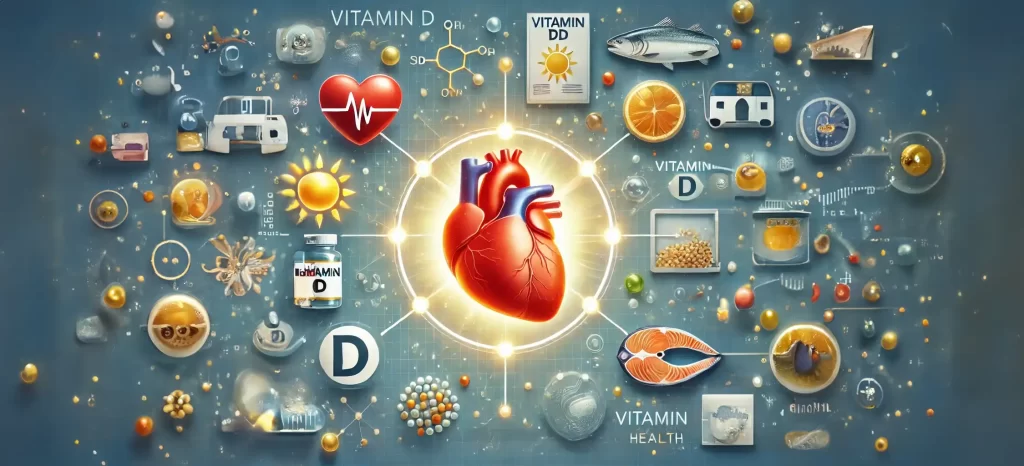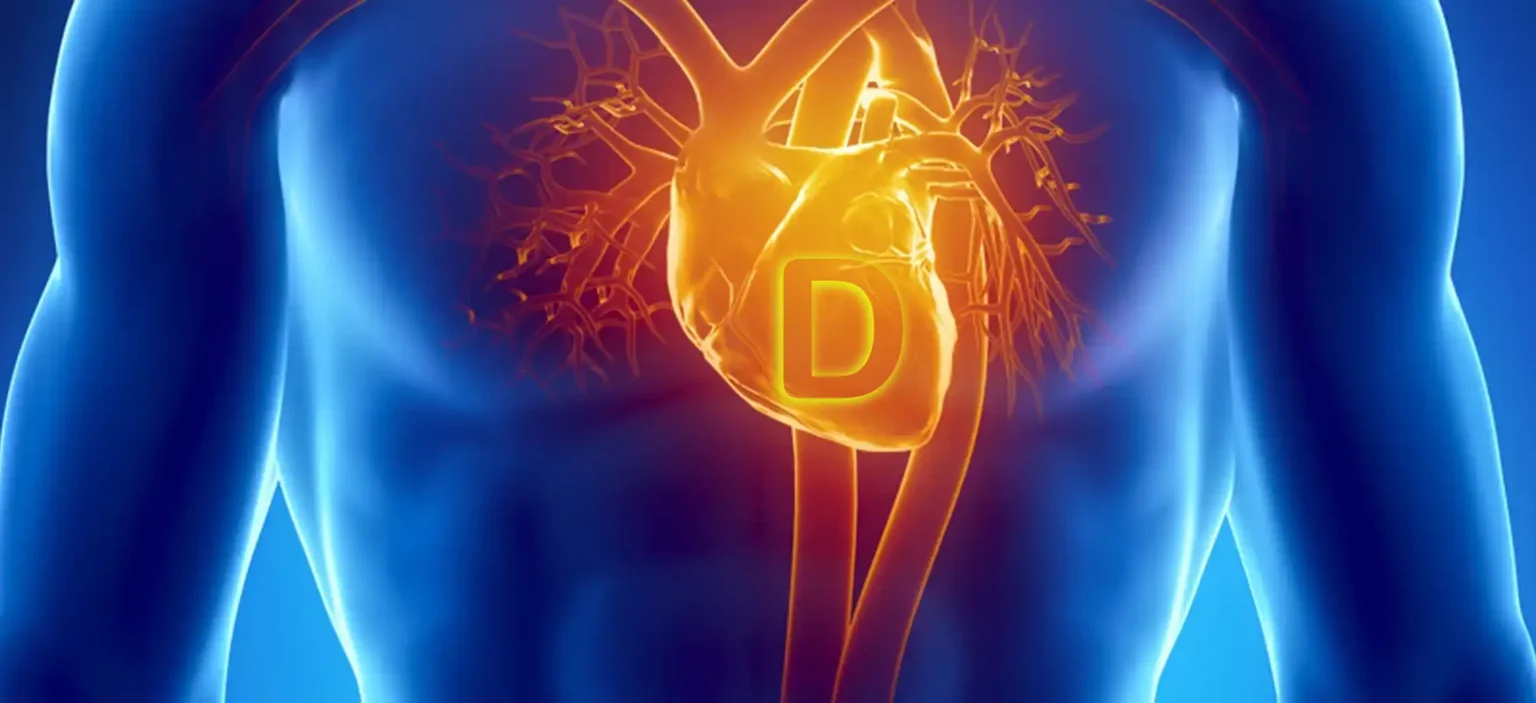Vitamin D, often dubbed the “sunshine vitamin,” plays a crucial role in maintaining various physiological functions beyond its well-known benefits for bone health. This essential nutrient, synthesized by our skin when exposed to sunlight and also obtained through certain foods and supplements, is increasingly recognized for its extensive health benefits.
General Health Benefits of Vitamin D
Vitamin D is instrumental in calcium absorption, crucial for maintaining bone density and preventing osteoporosis. However, its benefits extend to many other aspects of health, including:
- Immune System Support: Vitamin D is vital for immune system regulation, helping to ward off infections and illnesses.
- Muscle Function: Adequate levels of Vitamin D are important for muscle function, reducing the risk of falls and muscle weakness, particularly in older adults.
- Anti-Inflammatory Properties: It plays a role in reducing inflammation throughout the body, which is crucial for preventing chronic diseases.
Focus on Cardiovascular Diseases
Emerging research suggests a significant link between Vitamin D levels and cardiovascular health. Deficiencies in Vitamin D have been associated with an increased risk of high blood pressure, heart attack, and stroke. It is believed that Vitamin D helps to regulate blood pressure, improve arterial stiffness, and modulate the function of heart and blood vessels. This section of our discussion will delve into how maintaining adequate Vitamin D levels can be a critical component in preventing and managing cardiovascular diseases.

The complexity of Vitamin D’s role in cardiovascular health highlights the need for a more nuanced understanding of how this vitamin influences heart function and overall cardiovascular risk. This introduction sets the stage for a deeper exploration into the specific impacts of Vitamin D on heart health, underlining the importance of this nutrient in a heart-healthy lifestyle.
Vitamin D Basics: Essential for Health
Vitamin D, a crucial nutrient for overall health, is unique among vitamins because it can be synthesized by the body through sunlight exposure. Here’s a fundamental look at what Vitamin D is, how it is obtained, and its vital roles in the body.
What is Vitamin D?
Vitamin D is a fat-soluble vitamin that exists in two main forms: Vitamin D2 (ergocalciferol), which is mostly obtained from plant sources and fortified foods, and Vitamin D3 (cholecalciferol), which is derived from animal sources and sunlight exposure. Vitamin D is best known for its role in calcium absorption and bone health but has far-reaching effects on various bodily functions.

How is Vitamin D Obtained?
The primary source of Vitamin D is sunlight. When ultraviolet B (UVB) rays from the sun strike the skin, they convert cholesterol in the skin into Vitamin D3. However, factors like geographic location, skin pigmentation, sunscreen use, and seasonal changes can affect UV exposure and Vitamin D synthesis. Aside from sunlight:
- Dietary Sources: Vitamin D can be obtained from foods such as fatty fish (salmon, mackerel, and sardines), fish liver oils, and eggs. Fortified foods like milk, orange juice, and cereals also contribute to Vitamin D intake.
- Supplements: Vitamin D supplements are another source, especially useful in regions with limited sunlight exposure or for individuals at risk of deficiency.
The Biological Role of Vitamin D in the Body
Vitamin D’s biological roles are extensive:
- Bone Health: It promotes the absorption of calcium and phosphorus from the gut, essential for forming and maintaining strong bones.
- Immune System Function: Vitamin D modulates the immune system by enhancing the pathogen-fighting effects of monocytes and macrophages and reducing inflammation.
- Cardiovascular Function: It is involved in regulating blood pressure and preventing arterial stiffness, which can help reduce the risk of cardiovascular disease.
- Muscle Function: Adequate Vitamin D levels are crucial for muscle contraction, which is essential for everyday movements.
Understanding these basics of Vitamin D helps in appreciating its importance in maintaining not just bone health, but a wide range of physiological functions that contribute to overall well-being.
Link Between Vitamin D and Cardiovascular Health
Recent studies have increasingly highlighted the critical role of Vitamin D in maintaining cardiovascular health. This section delves into the research findings that link Vitamin D levels to various aspects of heart health and explains how this vital nutrient influences cardiovascular functions.
Research Findings on Vitamin D and Heart Health
A growing body of research suggests that adequate levels of Vitamin D are essential for good cardiovascular health. Several epidemiological studies have found a correlation between low Vitamin D levels and an increased risk of heart diseases, including hypertension, heart attack, and stroke. These studies indicate that Vitamin D deficiency may be a risk factor for cardiovascular disease, possibly due to its effects on calcium metabolism and inflammation.
Impact of Vitamin D on Blood Pressure and Inflammation
Vitamin D plays a significant role in regulating blood pressure. It is believed to influence this through its effect on calcium metabolism, which is crucial for the contraction and relaxation of the heart muscle and the smooth muscle cells within the vascular system. Moreover, Vitamin D can modulate the renin-angiotensin system (RAS), which helps regulate blood pressure. By inhibiting this system, Vitamin D helps lower blood pressure levels, reducing the strain on the cardiovascular system.
In terms of inflammation, Vitamin D has anti-inflammatory properties. Chronic inflammation is associated with an increased risk of heart disease, and by reducing inflammation, Vitamin D helps protect the cardiovascular system. It modulates the body’s immune response, decreasing the production of pro-inflammatory cytokines while promoting anti-inflammatory mechanisms.
Vitamin D’s Effects on Heart Function
Vitamin D also affects the heart directly. It is involved in the regulation of several genes and proteins that are important for heart function. Research has shown that Vitamin D can help improve the heart’s contractile function, which is vital for pumping blood efficiently throughout the body.
In summary, Vitamin D is not only essential for bone health but also plays a significant role in maintaining cardiovascular health. Its ability to regulate blood pressure, reduce inflammation, and enhance heart function underscores the importance of maintaining adequate Vitamin D levels as part of a heart-healthy lifestyle.
Vitamin D Deficiency and Heart Disease
Vitamin D deficiency is alarmingly common and is increasingly being recognized as a significant risk factor for various forms of cardiovascular disease (CVD). Here we explore the statistical evidence linking Vitamin D deficiency to increased cardiovascular risks and the mechanisms by which low Vitamin D levels may contribute to heart disease.
Statistics and Studies on Vitamin D Deficiency
Studies across diverse populations reveal that Vitamin D deficiency is prevalent worldwide, with estimates suggesting that about 1 billion people globally have insufficient levels of this crucial vitamin. In regions with limited sunlight exposure, especially during winter months, and among populations with diets low in natural Vitamin D sources, these numbers are particularly stark.
Research consistently shows that low levels of Vitamin D are associated with an increased risk of cardiovascular events. For instance, a meta-analysis has indicated that individuals with Vitamin D levels below 15 ng/ml have a significantly higher risk of heart disease compared to those with levels considered sufficient.
Correlation Between Low Vitamin D Levels and Cardiovascular Diseases
Vitamin D deficiency has been linked to several mechanisms that increase the risk of heart disease:
- Endothelial Dysfunction: Vitamin D is vital for the endothelial cells that line the heart and blood vessels. Deficiency can lead to dysfunction of these cells, which is an early marker of cardiovascular disease and involves reduced ability to regulate blood pressure and blood clotting.
- Increased Blood Pressure: As previously mentioned, Vitamin D helps regulate the renin-angiotensin system, which affects blood pressure. Insufficient Vitamin D levels can lead to an overactivation of this system, thereby increasing blood pressure and the risk of heart disease.
- Inflammation: Vitamin D plays a role in reducing inflammation, a key contributor to the pathology of heart disease. Low levels of Vitamin D may lead to increased inflammatory responses, which are involved in the development and progression of cardiovascular disease.
The implications of these findings are clear: maintaining adequate Vitamin D levels is essential for cardiovascular health. This can be particularly challenging in areas with low sunlight exposure, necessitating greater attention to diet and supplementation.
Benefits of Vitamin D for the Cardiovascular System
Vitamin D is increasingly recognized not just for its role in bone health but also for its significant benefits to the cardiovascular system. Understanding how this essential nutrient helps prevent heart disease and supports heart health is crucial for overall wellness.
Prevention of Heart Disease
Vitamin D plays a multifaceted role in heart health, primarily through its ability to modulate and prevent several risk factors associated with cardiovascular diseases:
- Anti-inflammatory Effects: Vitamin D can reduce systemic inflammation, a key contributor to cardiovascular disease. By lowering inflammation, Vitamin D helps reduce the risk of chronic heart conditions.
- Protection Against Vascular Damage: Vitamin D is crucial for maintaining the integrity of the endothelial cells that line the blood vessels. It helps prevent the onset of vascular stiffness and atherosclerosis, conditions that can lead to heart attacks and strokes.
- Modulation of Heart Muscle Function: Adequate levels of Vitamin D are essential for the proper functioning of the heart muscle. It helps regulate calcium levels within heart muscle cells, ensuring effective heart contractions and maintaining the heart’s pumping ability.
Regulation of Blood Pressure
One of the standout roles of Vitamin D in cardiovascular health is its impact on blood pressure regulation:
- Influence on Renin-Angiotensin System (RAS): Vitamin D inhibits the renin-angiotensin system, which if overactivated, can lead to hypertension. By modulating this system, Vitamin D helps maintain normal blood pressure levels.
- Calcium Balance: By facilitating calcium metabolism, Vitamin D ensures that calcium is adequately available for conducting proper muscle function, including the heart and the muscular walls of blood vessels.
Preventing Artery Damage
Vitamin D’s ability to prevent artery damage is linked to its regulatory roles in calcium absorption and inflammation reduction. Adequate Vitamin D levels prevent the calcification of blood vessels, which is crucial in avoiding the hardening of arteries that can lead to cardiovascular complications.
The comprehensive benefits of Vitamin D underscore the importance of maintaining sufficient levels of this vitamin, whether through sun exposure, diet, or supplementation. Ensuring that you have adequate Vitamin D is not just a step towards healthier bones but a critical measure for sustaining heart health and preventing heart disease.
Optimal Vitamin D Levels for Heart Health
Maintaining optimal Vitamin D levels is crucial for cardiovascular health. Here’s a guide on the recommended levels and how to achieve and maintain them through various sources.

Recommended Vitamin D Levels
The amount of Vitamin D required can vary based on age, geographic location, skin color, and current health conditions. Generally, the following guidelines from health authorities like the Institute of Medicine and the Endocrine Society can be considered:
- Adults (18-70 years): 600-800 IU/day
- Adults (over 70 years): 800 IU/day
- Higher needs (pregnant, breastfeeding, or at risk for deficiency): 1,000-2,000 IU/day
For heart health, some studies suggest maintaining a blood level of Vitamin D (25(OH)D) around 30-50 ng/mL. It’s important to consult with a healthcare provider to determine the exact levels suitable for your specific health needs.
Achieving and Maintaining Optimal Levels
- Sunlight Exposure:
- The body synthesizes Vitamin D when skin is exposed to sunlight. About 10-30 minutes of midday sun exposure several times a week may help maintain levels, depending on your location and skin type. Always balance sun exposure with skin cancer risk.
- Diet:
- Include foods naturally rich in Vitamin D in your diet:
- Fatty fish: Such as salmon, mackerel, and sardines.
- Egg yolks: Small amounts of Vitamin D are found in the yolks.
- Fortified foods: Many dairy products, orange juice, and cereals are fortified with Vitamin D.
- Include foods naturally rich in Vitamin D in your diet:
- Supplements:
- Vitamin D supplements can be crucial, especially in areas with limited sunlight. Vitamin D3 supplements are often recommended for better raising blood levels. Ensure to discuss with a healthcare provider for appropriate dosages and monitoring.
Achieving and maintaining adequate Vitamin D levels can significantly influence cardiovascular health, helping prevent heart disease and maintaining optimal heart function.
Controversies and Debates on Vitamin D Dosage
The discussion surrounding the optimal dosage of Vitamin D, especially when it comes to megadoses, is marked by diverse viewpoints within the medical and scientific communities. This section explores these controversies and provides insights from leading researchers, including Dr. Michael Holick, known for his extensive research on Vitamin D.
Differing Viewpoints on Vitamin D Dosages
The consensus on Vitamin D dosage varies significantly among experts. Standard guidelines suggest 600-800 IU/day for most adults, while some researchers advocate for higher doses, especially in populations at higher risk for deficiency. However, the debate intensifies around the safety and efficacy of megadoses, which can be tens or even hundreds of times higher than the recommended daily allowance.

Megadoses of Vitamin D
Proponents of megadoses argue that such high doses are necessary to correct deficiencies rapidly, especially in individuals with severely low levels of Vitamin D, who may not respond to standard doses. They suggest that megadoses can quickly replenish Vitamin D stores, providing immediate benefits in bone health and immune function.
Critics, however, caution against potential toxicity and the risk of hypercalcemia—a condition caused by too much calcium in the blood, which can lead to vascular and tissue calcification, kidney stones, and renal failure. They advocate for more gradual supplementation strategies to avoid these risks.
Insights from Dr. Michael Holick
Dr. Michael Holick, a prominent figure in this debate, supports the use of higher doses of Vitamin D in certain circumstances. According to Dr. Holick, while the fear of toxicity has led to conservative official recommendations, Vitamin D toxicity is actually quite rare and only occurs from extremely high doses taken over extended periods.
Dr. Holick emphasizes that the benefits of ensuring sufficient Vitamin D levels—particularly in improving muscle strength, immune function, and reducing inflammation—are significant and often outweigh the risks when managed correctly. He advocates for individualized dosage plans based on blood tests and monitored by healthcare professionals.
Conclusion
The controversies over Vitamin D dosages highlight the need for personalized medical advice and further research. Patients and healthcare providers are encouraged to weigh the benefits and risks of Vitamin D supplementation, considering individual health needs and specific conditions.
Practical Tips for Incorporating Vitamin D for Heart Health
Incorporating Vitamin D into your daily routine can significantly benefit your cardiovascular health. Here are some practical tips on how to safely integrate this essential nutrient into your life and when to consult healthcare providers for Vitamin D supplementation.
1. Balanced Sun Exposure:
- Sunlight is a natural source of Vitamin D. Aim for 10-20 minutes of midday sun exposure several times a week, depending on your skin type and geographic location. Remember to balance sun exposure with skin cancer risk by not overexposing yourself and using sunscreen after the initial exposure period.
2. Dietary Sources:
- Include foods rich in Vitamin D in your diet. Fatty fish like salmon, mackerel, and sardines are excellent sources. Egg yolks and fortified foods such as milk, orange juice, and cereals also contribute to your daily Vitamin D intake. Try to incorporate these into your meals consistently.
3. Vitamin D Supplements:
- If you are unable to get enough Vitamin D from sunlight and diet alone, consider supplements. Vitamin D3 supplements are generally more effective than D2 at raising blood levels of Vitamin D.
- Start with a moderate dose, such as 600 to 800 IU daily, and adjust based on blood tests and your doctor’s recommendations.
4. Regular Monitoring:
- It’s important to monitor your Vitamin D levels, especially if you are taking supplements. Have your blood levels checked at least annually to ensure they are within the optimal range and adjust your supplementation as needed.
5. Consult Healthcare Providers:
- Always consult with a healthcare provider before starting any new supplement regimen. This is especially important if you have health conditions that might be affected by increased Vitamin D intake, such as kidney disease or hyperparathyroidism.
- Discuss your individual needs based on factors like age, health status, and existing medical conditions to determine the right dosage for you.
6. Be Aware of Symptoms of Overdose:
- Although Vitamin D toxicity is rare, it’s important to be aware of the symptoms, such as nausea, vomiting, weakness, and serious complications like kidney damage. If you experience any of these symptoms, consult a healthcare provider immediately.
These tips are designed to help you safely benefit from Vitamin D without the risk of adverse effects. Maintaining optimal levels of this vitamin can support not only your bone health but significantly contribute to your heart health and overall well-being.
Conclusion: The Heart-Protective Role of Vitamin D
As we conclude our exploration of Vitamin D and its pivotal role in cardiovascular health, it’s clear that this nutrient is much more than just a bone-builder. Its broad-reaching effects are crucial for maintaining a healthy heart and a robust cardiovascular system.
Recap of Vitamin D’s Importance for Heart Health
Vitamin D helps to regulate blood pressure, reduce inflammation, and prevent artery damage, all of which are vital for preventing heart diseases such as hypertension, heart attacks, and strokes. Maintaining adequate levels of Vitamin D is essential not only for bone health but also for supporting heart function and overall cardiovascular wellness.
Encouragement for a Heart-Healthy Lifestyle
Consider Vitamin D levels as a key component of your heart-health strategy. Regular exposure to sunlight, a diet rich in natural Vitamin D sources, and appropriate supplementation can help maintain these levels, reducing your risk of cardiovascular diseases. Regularly monitoring your Vitamin D status, especially if you are at risk for deficiency, is crucial in ensuring that your heart remains healthy.
Incorporate Vitamin D into your daily routine as part of a comprehensive approach to a heart-healthy lifestyle. Discuss with your healthcare provider the best strategies for you based on your health profile and lifestyle to ensure you are getting the most benefit from Vitamin D.
Ressources
Vitamin D Council
- Provides comprehensive information on Vitamin D, including research updates and health guidelines.
- Vitamin D Council Website
National Institutes of Health (NIH) – Office of Dietary Supplements
- Offers detailed fact sheets on Vitamin D, covering everything from health benefits to dosage recommendations.
- NIH Vitamin D Fact Sheet
The Vitamin D Society
- A Canadian non-profit group dedicated to spreading awareness about Vitamin D and its many health benefits.
- Vitamin D Society Website
PubMed Central
- A free full-text archive of biomedical and life sciences journal literature. It’s a valuable resource for finding scientific studies on Vitamin D and cardiovascular health.
- PubMed Central


1 thought on “Shield Your Heart: How Vitamin D Fights Cardiovascular Disease”